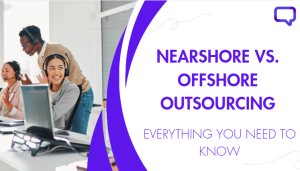When you think about outsourcing customer service, it’s like finding the right partner for a crucial part of your business. It’s about balancing the scales – getting the most out of what you pay while making sure your customers are happy and well taken care of.
Let’s talk about customer service outsourcing pricing and how to make sure you’re getting the best deal without sacrificing the quality that your customers expect. It’s about making informed choices. Let’s dig in!
Onshore vs. Offshore Customer Service Outsourcing
On one side, you have onshore outsourcing; on the other, offshore. Which is the one for you? Let’s find out.

Offshore Outsourcing
Imagine having a team that works while you sleep, making progress 24/7. That’s offshore outsourcing for you—hiring a team in a different part of the world to take care of your customer service needs. It’s like having a baton pass in a relay race; the work never stops, and your business keeps moving forward, day and night.
Onshore Outsourcing
Partnering with a team within your own country to manage your customer service – that’s onshore outsourcing. It’s like having your neighbors help you out; they know the area, speak the language fluently, and understand the local culture inside out. However, onshore outsourcing can get VERY expensive.
Onshore vs. Offshore Outsourcing: Pricing Comparison
The costs vary by region but the usual trend is: South Asian and South-East Asian countries offer the lowest-priced customer service outsourcing plans. A huge chunk of the U.S. and European companies outsource to the countries in these regions for 3 main reasons:
- Low cost and overhead
- Diverse talent pool
- Time Zones
Let’s take a look at the average cost/hour of the major regions globally when it comes to customer service outsourcing.

What’s Included in Your Call Centre Outsourcing Costs
When you’re looking into outsourcing your call center, it’s like picking a mobile phone plan. You need to know exactly what you’re getting and what you’ll be paying extra for. Let’s break down the typical inclusions and exclusions in call center outsourcing costs, making it as straightforward as possible.
What’s Usually Included
Agent Salaries: This is the core of what you’re paying for — the people who will be talking to your customers.
Training: Most reputable call centers include initial training costs in their pricing. This ensures the agents understand your product or service and can represent your brand effectively.
Infrastructure: The physical or virtual setup, including workstations and telecom systems, is generally part of the package. No need to worry about the nuts and bolts of where and how agents work.
Management: The oversight of your outsourced team, including team leads or managers who handle day-to-day operations, is typically included.
Basic Reporting: Expect some level of reporting on key performance indicators (KPIs) like call volume, service level agreements (SLAs), customer satisfaction scores, etc.
Factors That Impact the Price
Let’s go over a few factors that can impact the cost when it comes to customer service outsourcing.
Number of Agents and Service Hours
Impact on Cost: The more agents you need and the longer the hours they cover, the higher the cost. This includes considering the volume of calls or inquiries your business receives and ensuring you have enough staff to maintain service quality without overextending your budget.
Strategic Consideration: Evaluate your call volume peaks and troughs to optimize the number of agents and their working hours, potentially using a mix of full-time and part-time agents to cover busy periods efficiently.
Time of Day and Week
Pricing Variations: Services during peak hours, such as evenings, weekends, and overnight, typically come at a premium. This is due to the extra effort required to staff these less desirable hours.
Choosing Wisely: Align your customer service hours with your customers’ most active times. If your business caters to a market that is active in the evenings or on weekends, investing in extended hours support might offer a better customer experience and a competitive edge.
Preferred Communication Channels
Customer Preferences: Diverse customer bases have different preferences for communication, including phone, live chat, email, support portals, and social media. Offering support across these channels can enhance satisfaction but may also affect costs.
Channel Strategy: Select channels based on your customer demographics and preferences. Integrating a mix of human and automated responses can optimize efficiency and satisfaction, keeping costs in balance with service quality.
Agent Skills and Specialties
Skillset Costs: Agents with specific language capabilities, industry experience, or technical skills may command higher wages. Specialized campaigns, such as those requiring legal or medical knowledge, will also incur premium rates.
Balancing Expertise and Cost: Determine the level of specialization your customer service requires. For some businesses, a general skill set with targeted training might suffice, whereas others might benefit from a more specialized approach despite the higher cost.
Complexity of Use Cases
Service Complexity: More complex customer service scenarios require agents with higher skill levels or specialized knowledge, leading to increased costs.
Efficiency vs. Expertise: For complex products or services, investing in specialized agents can improve resolution times and customer satisfaction, potentially saving costs associated with longer handling times or repeat calls.
Read More: How to Outsource Customer Support in 8 Simple Steps
5 Factors Determining the Outsourced Call Center Costs
1. Location, Location, Location
Just like real estate, where your call center sits on the map matters. Opting for a spot in countries with lower living costs – think Pakistan, India, the Philippines, or Mexico – might save you a bundle compared to setting up shop in the US or Canada. It’s all about finding the right balance between cost and quality.
2. Who’s Answering the Call?
Labor costs are a big deal. You want experts on the line, right? But expertise costs money, especially if you’re looking for agents fluent in multiple languages or with niche skills. Plus, don’t forget about local laws and benefits – they all add up.
3. The Tech Behind the Talk
A call center’s backbone is its infrastructure. We’re talking about the tech and tools needed to keep those conversations flowing. Some providers have all the gadgets and gizmos ready to go, while others might need you to chip in for the setup.
4. Ready to Grow?
Scalability is key. Your business isn’t static, and your call center shouldn’t be either. Providers that let you scale up or down as needed might charge a bit more for the flexibility, but it could be worth it for the agility it offers your business.
5. Keeping Quality in Check
Lastly, don’t skimp on quality. Monitoring calls, training agents, and keeping managers in the loop ensures your customers are getting top-notch service. It’s an investment in your brand’s reputation and customer satisfaction. Monitor those KPIs to keep everything in check.
Looking for the perfect call center outsourcing partner? Check top picks for the top 10 call center outsourcing services.


